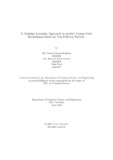| dc.contributor.advisor | Majumdar, Mahbubul Alam | |
| dc.contributor.advisor | Shoumo, Syed Zamil Hasan | |
| dc.contributor.author | Rahman, Md. Nowroz Junaed | |
| dc.contributor.author | Pantho, Md. Humaun Kabir | |
| dc.contributor.author | Fuad, Nafis | |
| dc.date.accessioned | 2021-06-01T17:46:37Z | |
| dc.date.available | 2021-06-01T17:46:37Z | |
| dc.date.copyright | 2020 | |
| dc.date.issued | 2020-04 | |
| dc.identifier.other | ID: 16101158 | |
| dc.identifier.other | ID: 16101156 | |
| dc.identifier.other | ID: 16101267 | |
| dc.identifier.uri | http://hdl.handle.net/10361/14463 | |
| dc.description | This thesis is submitted in partial fulfillment of the requirements for the degree of Bachelor of Science in Computer Science and Engineering, 2020. | en_US |
| dc.description | Cataloged from PDF version of thesis. | |
| dc.description | Includes bibliographical references (pages 65-68). | |
| dc.description.abstract | The right to vote is considered to be the backbone of democracy. As we are entering
the third decade of 21st century more and more countries around the world are
adopting the democratic government system. One of most important element of
democratic country is the power vested in the common people and one of the way
the people are expected to exercise this power is to elect a qualified candidate to lead
their country. The only way to make this election process effective is to make sure
everybody participates in the process. The people who are eligible to participate in
this election process to elect a candidate are called ”voters”. A substantial amount
of these voters are young voter or voters who have newly been registered. It has been
noticed that young voters in most of the countries are reluctant to participate in the
voting process. There are many social, psychological and other non-political factors
behind this reluctance. This research seeks to find those factors that motivates
or repels a young voter to participate in the voting process. Besides finding the
factors this research will also try to determine whether a young voter is likely to
vote in an election or not based on those factors mentioned before. The data set
of this research was prepared by surveying via Google Forms. Later the data set
was analyzed to find out the reasons behind their participation. RFECV was used
to select the optimum features and later Support Vector Machine, Random Forest,
Extreme Gradient Boosting and Naive Bayes were used to predict voter participation
based on the set of optimum features. In such an experimental setup Extreme
Gradient Boosting and Support Vector Machine with a Gaussian kernel has shown
more promising results than the other aforementioned models. The aim of this
research is to predict whether a young voter will participate in the voting process or
not and find the reasons behind it so, that maximum voter turnout can be ensured
and perfect democracy can be achieved. | en_US |
| dc.description.statementofresponsibility | Md. Nowroz Junaed Rahman | |
| dc.description.statementofresponsibility | Md. Humaun Kabir Pantho | |
| dc.description.statementofresponsibility | Nafis Fuad | |
| dc.format.extent | 70 pages | |
| dc.language.iso | en_US | en_US |
| dc.publisher | Brac University | en_US |
| dc.rights | Brac University theses are protected by copyright. They may be viewed from this source for any purpose, but reproduction or distribution in any format is prohibited without written permission. | |
| dc.subject | Machine Learning | en_US |
| dc.subject | Voting | en_US |
| dc.subject | Young Voter Turnout | en_US |
| dc.subject | Random Forest | en_US |
| dc.subject | Support Vector Machine | en_US |
| dc.subject | XGBoost | en_US |
| dc.subject | Naive Bayes | en_US |
| dc.subject | Non-political | en_US |
| dc.title | A machine learning approach to predict young voter enthusiasm based on non-political factors | en_US |
| dc.type | Thesis | en_US |
| dc.contributor.department | Department of Computer Science and Engineering, Brac University | |
| dc.description.degree | B. Computer Science | |

